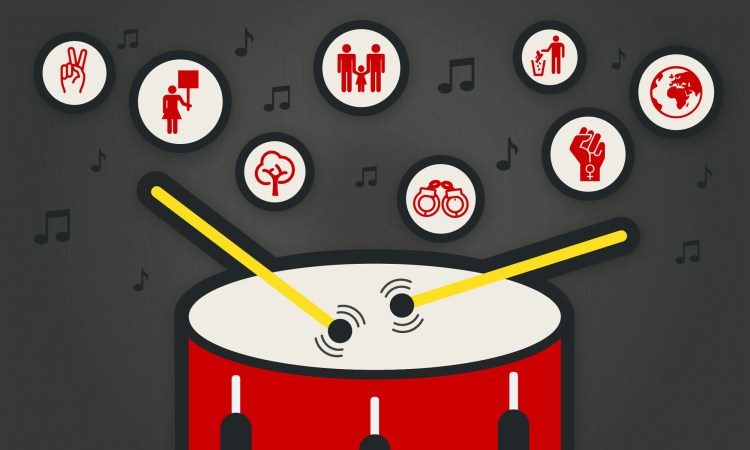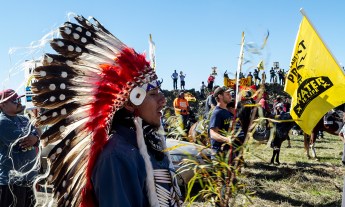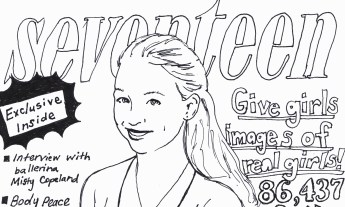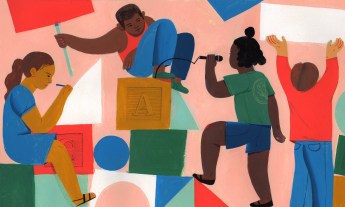
Over the course of 25 years, folk rock icons Indigo Girls — Amy Ray and Emily Saliers — have not only released more than a dozen albums, they have also displayed a deep dedication to social, political and environmental issues, mixing music and activism in equal parts.
In 1993, they co-founded Honor the Earth, the Native American support and awareness group, along with activist Winona LaDuke — and two decades on, they’re still actively involved with that cause and others, from immigration reform to campaigning against the death penalty. On the eve of the release of One Lost Day, their first studio album in four years — and their performance at TEDWomen on Wednesday night — we spoke to Ray about how they speak up for what they believe in (without getting preachy), the evolution of their music, and the state of women around the world.
Over the years, how have you used your music to help interest people in causes that they might not otherwise know or care about?
We access activism through our work by gathering people together at a show. Sometimes the shows raise money, sometimes the shows raise awareness, and sometimes we do specific benefits for specific things. We let people know that they can choose whether they want to be part of it or not.
“We wanted to have shows that were for something other than just making the bar money and selling drinks.”
How did you get involved with activism?
When we started out, we were part of this community in Atlanta and we wanted to give back. We wanted to have shows that were for something other than just making the bar money and selling drinks. We started raising money for a soup kitchen or an HIV program — stuff that would have a direct impact on exactly where we were and who was in our audience.
Over the years, how did it evolve?
As our career grew and we had more resources and contacts and the ability to garner money, support or access to legislative people, we saw ourselves as being amplifiers for the voices that weren’t getting heard. Take Native issues. It was more important for them to be heard than for us to be heard. Exposure waxes and wanes, so when we had a lot of it, we leveraged it. Bonnie Raitt really helped us learn how to do this. We watched her at press conferences and the question would go to her and she would immediately field it to the person sitting beside her who was the expert in that area.
What have you learned along the way?
We’ve learned to use our resources. When we were on Sony Records, we were part of a big monolithic corporation that made video cameras too, so we would say, “Okay, if we’re going to go down and work with the Zapatistas, we’re going to grab a couple of video cameras and give them to them too.” It was as simple as getting cameras for a tribe. We would also do email blasts, or have an [information] table at our shows so people could learn about issues. But we also learned how to do that the right way. Like, if you have a table you need to make sure you announce it. Or if you want to talk about an issue at a show, it’s more effective to bring up a speaker for three minutes from that group, instead of you talking about it. Have them speak while you stand there with them and make sure people are listening. And you don’t do it before you start when no one’s in the room, you do it in the middle of the show when everyone’s there.
How have other musicians taught or inspired you when it comes to fighting for a cause?
R.E.M., Rage Against the Machine, Jackson Browne and other activists are people we’ve watched and paid attention to. It’s not like we’re these whiz kids who came up with ways to be effective; we just took lessons from people and got schooled from our elders. We also work with this group called Revolutions per Minute. It’s an umbrella organization that helps musicians do activism work more effectively.
It’s interesting how much thought goes into being effective activists. Because there is definitely a right and wrong way to do it.
We love writing and playing music, but it wouldn’t be as poignant to us if we didn’t have this other stuff going on. It’s energizing to work on some kind of fundraising campaign for a school for refugee kids at the same time that we’re working on a new record. It gives us more of a purpose. It’s like, “If this record does really well, we can do a bigger ‘Honor the Earth’ tour.” That’s how both of our minds work, so we’re lucky in that way. It makes it fun to connect our strategy for our music with our strategy for our activism.
“You try to talk about things in a way that is in the interest of the people in the community and not just in the interest of your self-righteous principles.”
Is there a key to doing it without sounding preachy?
I don’t know, sometimes we do sound preachy, and it’s just because we’re enthusiastic and we get carried away. Something else I’ve learned along the way is that things are not black and white. For instance, if you’re working on the environmental impacts of coal mining, you need to be thinking about the jobs that are in that community from coal mining, and what it means to those people to have a job. You try to talk about things in a way that is in the interest of the people in the community and not just in the interest of your self-righteous principles. It’s really important to let people in that community talk. So if we were working on an issue around buffalo and cattle farmers out in Yellowstone, we’d work with some ranchers who were pro-buffalo to talk about the issues to other ranchers, because it’s ridiculous for us to go in there as southeastern white people who know nothing about ranching. It’s not effective, either. It’s like the hippies invading a conservative town. You have to have empathy for the other side of the equation. There are a lot of gray areas, and you really need to respect the other side no matter how self-righteous you feel.
Have your fans ever had a bad reaction to any of your causes?
A lot of fans would get mad at us for being pro-choice and walk out of shows. We have a lot of people of faith in our audience who feel really strongly about what they believe, and so you just have to respect it and be like, “It’s okay. We don’t expect everyone in our audience to feel the same way we do, and that’s why America is what it is.”
The theme of this year’s TEDWomen conference is “Momentum.” What kind of momentum do you have right now?
For us, what creates momentum is to make sure we’re taking care of the art side of our equation too — to try to be better songwriters and have really good shows and keep our career moving forward and evolving. It’s kind of like putting on your own air mask before you try to help somebody else out.
That’s a great analogy.
It works for everything. Then there are times when we don’t feel like we have momentum, and we don’t have as many funds as we need. Every time we feel like something’s waning, we go back into it with energy and ask, “What is happening right now and how do we fix it and how do we infuse freshness into this?” We’re not reinventing the wheel, because the wheel’s already been invented. We’re just reapproaching things. The momentum is all about learning. It’s letting it happen and not getting in your own way.
How far do you think women have come, and how far do we still have to go?
We have a long way to go; in the U.S. we don’t even have equal pay yet. And there’s a disconnect between how much advancement women have made generally in society — not as many people are going to be outwardly sexist as in the 1950s or ’60s — and our laws, which don’t match that for some reason. It’s really crazy to me. We’ve come a long way, but there’s still this core thing that hasn’t changed. But I really believe that you have to lift everyone up. I don’t think you can just be in your isolated “Women in the United States” corner, because the world is so connected. If a woman gets stoned to death somewhere, it affects women here.
Featured illustration by Celia Berger/TED.











